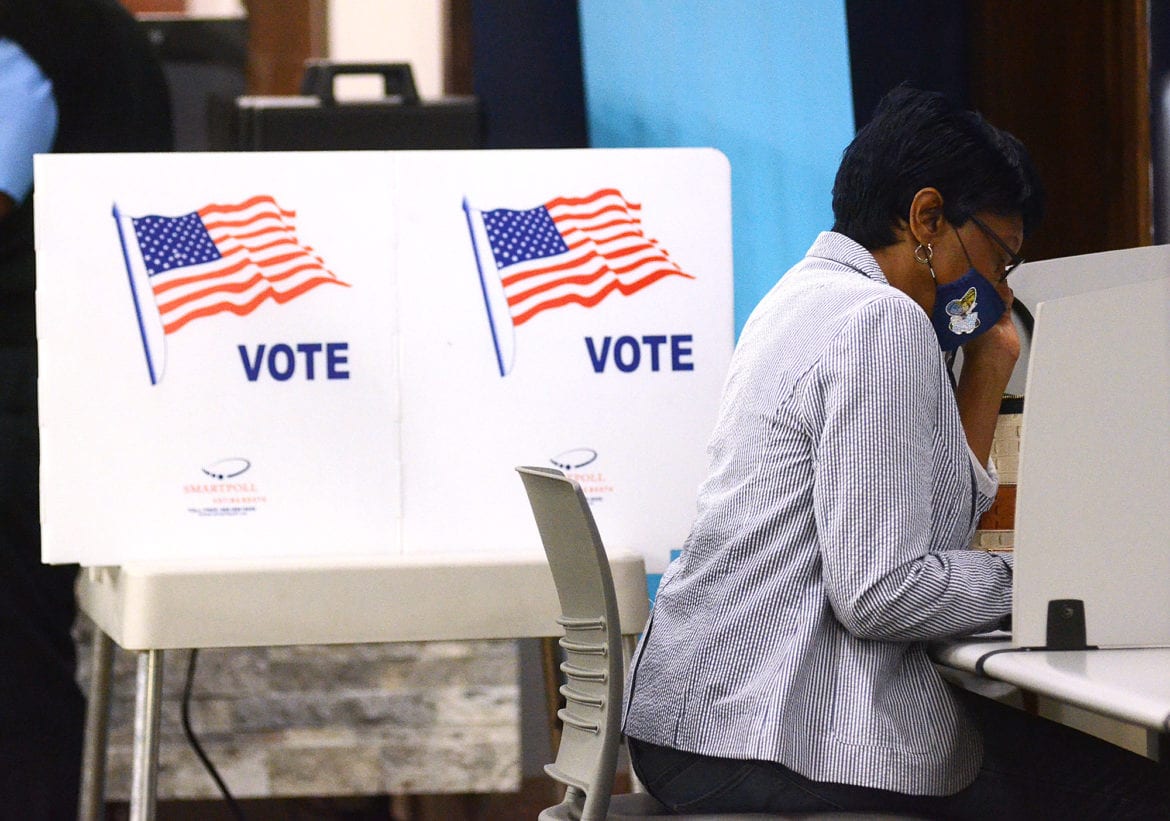Mississippi Today
Voter purge, military rights, ballot harvesting: Where several Mississippi election bills stand

Voter purge, military rights, ballot harvesting: Where several Mississippi election bills stand
Mississippi lawmakers, in the final two weeks of the 2023 legislative session, will hammer out details of a major election bill that could, among other things, give state officials power to purge “inactive” voters from the registered voter rolls.
Two other major election bills have already passed and await signature or veto from Gov. Tate Reeves.
Mississippi Today compiled an update below of the bill that’s still alive and summaries of the two bills that have already been sent to the governor.
House Bill 1310
The Senate has stripped from an elections bill a House provision that restored voting rights to military veterans convicted of felonies.
The provision restoring suffrage to veterans who had completed their sentence was removed t in the Senate Elections Committee chaired by Sen. Jeff Tate, R-Meridian. The bill still provides a mechanism to remove registered voters from the rolls if they do not vote within a specified period of time or perform other functions related to their voter registration, such as responding to jury duty.
While the Senate removed the language giving the right to vote back to veterans, that language remains alive in the process as House and Senate leaders try to hammer out the differences between the two chambers on House Bill 1310.
But it is unlikely that the House leadership will try during the negotiations process to have the provision restoring voting rights to military veterans included in the final version of the bill. While the amendment restoring voting rights for veterans offered by Rep. Tommy Reynolds, D-Water Valley, was approved overwhelmingly by the full membership during a floor vote, it was opposed by House leaders.
Rep. Brent Powell, R-Brandon, is the lead author on the legislation and will be one of the leaders working to hammer out a difference between the House and Senate versions of the bill. He said the Senate contends the language granting voting rights to veterans is unconstitutional, though it has long been the policy of the Legislature and never challenged that voting rights could be restored to large groups of people, such as veterans, without changing the felony disenfranchisement language in the Mississippi Constitution. After World War II the Legislature did just that — restore voting rights to veterans — without amending the constitution.
“I will ask them (Senate negotiators) about it, but I am not really for it,” said Powell, who opposed restoring voting rights to veterans convicted of felonies when it was offered on the House floor.
Mississippi is one of a handful of states — fewer than 10 — that do not restore the right to vote to all people convicted of a felony at some point after they complete their sentence. A challenge to the felony disenfranchisement provision of the Mississippi Constitution is pending before the U.S. Supreme Court.
The portion of the bill that House and Senate leaders support would have the potential to remove registered voters from the poll books. Under the provision, people who do not vote during a two-year period will be placed on an inactive list and can only vote via affidavit, meaning election officials must take action to officially accept the ballot before it can be counted. To regain unencumbered voting rights, the person would have to take affirmative action, such as returning a confirmation card or responding to jury duty or voting during the next two years. If they do none of those things during the two-year period, they are removed from the rolls and must re-register to vote.
As the bill was debated, many Democrats and a handful of Republicans expressed reservations about removing people from the rolls for not voting. Sen. David Jordan, D-Greenwood, said legislative leaders were taking drastic action to remove people from the rolls without providing any examples of the voter fraud they were trying to prevent.
“The right to vote includes the right not to vote,” said Sen. David Blount, D-Jackson.
Tate said, “Every vote is precious. So one fraudulent vote is just as bad (or) as precious as one (good) vote. What we want to do is clean up the voter rolls. When we have people on the rolls by name only and they are not actually living there, that is a vessel for fraud. And yes, there is voter fraud. What this does is give our local election officials another tool to clean up their rolls.”
Sen. Hob Bryan, D-Amory, said there are many people who are on the rolls, but only vote on occasion.
He pointed out a predominantly African American precinct in Amory where normally between 400 and 500 people vote. But in 2008 when Barack Obama was running for president more than 800 turned out to vote in the election where an African American was elected president for the first time in the nation’s history.
“How could you tell those people they are not allowed to vote?” he asked. Bryan added he is sure the same phenomenon in different precincts happened when Donald Trump was on the ballot. He said there are registered voters who do not vote because they are not enamored by the candidates on the ballot, but they should not be denied the right to vote when they are excited by someone on the ballot.
He said the bill had the potential to hurt people who are registered and eligible to vote, but only do so sporadically.
The bill also gives Secretary of State Michael Watson the authority to perform election audits and submit reports in all 82 counties during two election cycles — the 2023 statewide election and 2024 presidential election.
Senate Bill 2358
Two other election bills already are heading to the governor, who is expected to sign them into law.
Senate Bill 2358, authored by Tate, would prohibit the practice of a third party collecting a voter’s absentee ballot and delivering it to a clerk’s office or voting precinct. In some states, this practice has become widespread and supporters of the ban say it opens the process to election fraud by campaign operatives harvesting absentee ballots.
But opponents of the measure, mostly Democrats in both chambers, said it’s aimed at voter suppression and is a solution looking for a problem that doesn’t exist in Mississippi. They also raised concerns it would stifle voting by the military, elderly people, people in nursing homes or disabled people who more often vote absentee.
If signed into law, the bill would only allow U.S. Postal Service or common carriers; election workers doing their official duties; or family, household members or caregivers of the absentee voter to deliver ballots.
Slightly different versions of the measure had passed the House 73-44, and Senate 37-15, on mostly party line votes.
Rep. Willie Bailey, D-Greenville, attempted to kill the bill with a motion on the House floor, saying, “This is a bad bill, people.”
“This is oppressing people’s rights to vote in a democracy,” Bailey said. “This is making innocent people criminals … Everybody stands up here and salutes any time you say military, but then this is going to hurt the military, senior citizens and disabled … What is wrong with us?”
House Bill 1306
A measure that passed Wednesday would prohibit people from being on the ballot for elected office in Mississippi if they have failed to file campaign finance reports. House Bill 1306 would require a candidate to have filed any required campaign finance reports for the last five years in order to be eligible to be on the ballot.
The measure also included a provision prohibiting any unauthorized person from requesting an absentee ballot for someone else — making it a voter fraud crime punishable by a fine of $500 to $5,000 or being jailed up to a year. This provision drew much debate before the House voted 73-37 to send it to the governor. The Senate had passed it 52-0.
Rep. John Hines, D-Greenville, questioned whether this measure is “an attempt to railroad people in nursing homes or who are disabled” or otherwise unable to get their own absentee ballot from voting. He questioned whether a nursing home director could get absentee ballots from a county clerk for residents of the home.
House Elections Chairman Price Wallace, R-Mendenhall, responded, “That is not the intent of this bill,” and said that if nursing home residents requested a director or other caregiver get them a ballot there would be no problem. “But if that person running that nursing home does that without them asking for it, it’s fraudulent.”
This article first appeared on Mississippi Today and is republished here under a Creative Commons license.
Mississippi Today
New Stage’s ‘Little Women’ musical opens aptly in Women’s History Month
Ties that bind, not lines that divide, at the heart of “Little Women” are what make Louisa May Alcott’s beloved novel such an enduring classic. More than a century and a half since its 1868 publication, the March sisters’ coming-of-age tale continues to resonate in fresh approaches, say cast and crew in a musical version opening this week at New Stage Theatre in Jackson, Mississippi.
“Little Women, The Broadway Musical” adds songs to Alcott’s story of the four distinct March sisters — traditional, lovely Meg, spirited tomboy and writer Jo, quiet and gentle Beth, and artistic, pampered Amy. They are growing into young women under the watchful eye of mother Marmee as their father serves as an Army chaplain in the Civil War. “Little Women, The Broadway Musical” performances run March 25 through April 6 at New Stage Theatre.
In a serendipitous move, the production coincides with Women’s History Month in March, and has a female director at the helm — Malaika Quarterman, in her New Stage Theatre directing debut. Logistics and scheduling preferences landed the musical in March, to catch school matinees with the American classic.
The novel has inspired myriad adaptations in film, TV, stage and opera, plus literary retellings by other authors. This musical version debuted on Broadway in 2005, with music by Jason Howland, lyrics by Mindi Dickstein and book (script) by Allan Knee.
“The music in this show brings out the heart of the characters in a way that a movie or a straight play, or even the book, can’t do,” said Cameron Vipperman, whose play-within-a-play role helps illustrate the writer Jo’s growth in the story. She read the book at age 10, and now embraces how the musical dramatizes, speeds up and reconstructs the timeline for more interest and engagement.
“What a great way to introduce kids that haven’t read the book,” director Quarterman said, hitting the highlights and sending them to the pages for a deeper dive on characters they fell in love with over the two-and-a-half-hour run time.

Joy, familial warmth, love, courage, loss, grief and resilience are all threads in a story that has captivated generations and continues to find new audiences and fresh acclaim (the 2019 film adaptation by Greta Gerwig earned six Academy Award nominations).
In current contentious times, when diversity, equity and inclusion programs are being ripped out or rolled back, the poignant, women-centered narrative maintains a power to reach deep and unite.
“Stories where females support each other, instead of rip each other apart to get to the finish line — which would be the goal of getting the man or something — are very few and far between sometimes,” Quarterman said. “It’s so special because it was written so long ago, with the writer being such a strong dreamer, and dreaming big for women.
“For us to actualize it, where a female artistic producer chooses this show and believes in a brand new female director and then this person gets to empower these great, local, awesome artists — It’s just really been special to see this story and its impact ripple through generations of dreamers.” For Quarterman, a 14-year drama teacher with Jackson Public Schools active in community theater and professional regional theater, “To be able to tell this story here, for New Stage, is pretty epic for me.”
Alcott’s story is often a touchstone for young girls, and this cast of grown women finds much in the source material that they still hold dear, and that resonates in new ways.

“I relate to Jo more than any other fictional character that exists,” Kristina Swearingen said of her character, the central figure Jo March. “At different parts of my life, I have related to her in different parts of hers.”
The Alabama native, more recently of New York, recalled her “energetic, crazy, running-around-having-a-grand-old-time” youth in high school and college, then a career-driven purpose that led her, like Jo, to move to New York.
Swearingen first did this show in college, before the loss of grandparents and a major move. Now, “I know what it’s like to grieve the loss of a loved one, and to live so far away from home, and wanting to go home and be with your family but also wanting to be in a place where your career can take off. .. It hits a lot closer to home.”
As one of four sisters in real life, Frannie Dean of Flora draws on a wealth of memories in playing Beth — including her own family position as next to the youngest of the girls. She and siblings read the story together in their homeschooled childhood, assigning each other roles.

“Omigosh, this is my life,” she said, chuckling. “We would play pretend all day. … ‘Little Women’ is really sweet in that aspect, to really be able to carry my own experience with my family and bring it into the show. … It’s timeless in its nature, its warmth and what it brings to people.”
Jennifer Smith of Clinton, as March family matriarch Marmee, found her way in through a song. First introduced to Marmee’s song “Here Alone” a decade ago when starting voice lessons as an adult, she made it her own. “It became an audition piece for me. It became a dream role for me. It’s been pivotal in opening up doors for me.”
She relishes aging into this role, countering a common fear of women in the entertainment field that they may “age out” of desirable parts. “It’s just a full-circle moment for me, and I’m grateful for it.”

Quarterman fell in love with the 1969 film version she watched with her sister when they were little, adoring the family’s playfulness and stability. Amid teenage angst, she identified with the inevitable growth and change that came with siblings growing up and moving on. Being a mom brings a whole different lens.
“Seeing these little people in your life just growing up, being their own unique versions, all going through their own arc — it’s just fun, and I think that’s why you can stay connected” to the story at any life juncture, she said.
Cast member Slade Haney pointed out the rarity of a story set on a Northeastern homestead during the Civil War.
“You’re getting to see what it was like for the women whose husbands were away at war — how moms struggled, how sisters struggled. You had to make your own means. … I think both men and women can see themselves in these characters, in wanting to be independent like Jo, or like Amy wanting to have something of value that belongs to you and not just just feel like you’re passed over all the time, and Meg, to be valuable to someone else, and in Beth, for everyone to be happy and content and love each other,” Haney said.
New Stage Theatre Artistic Director Francine Reynolds drew attention, too, to the rarity of an American classic for the stage offering an abundance of women’s roles that can showcase Jackson metro’s talent pool. “We just always have so many great women,” she said, and classics — “To Kill a Mockingbird” and “Death of a Salesman,” for instance — often offer fewer parts for them, though contemporary dramas are more balanced.
Reynolds sees value in the musical’s timing and storyline. “Of course, we need to celebrate the contributions of women. This was a woman who was trying to be a writer in 1865, ’66, ’67. That’s, to me, a real trailblazing thing.
“It is important to show, this was a real person — Louisa May Alcott, personified as Jo. It’s important to hold these people up as role models for other young girls, to show that you can do this, too. You can dream your dream. You can strive to break boundaries.”
It is a key reminder of advancements that may be threatened. “We’ve made such strides,” Reynolds said, “and had so many great programs to open doors for people, that I feel like those doors are going to start closing, just because of things you are allowed to say and things you aren’t allowed.”
For tickets, $50 (discounts for seniors, students, military), visit www.newstagetheatre.com or the New Stage Theatre box office, or call 601-948-3533.
This article first appeared on Mississippi Today and is republished here under a Creative Commons license.![]()
Mississippi Today
Rolling Fork – 2 Years Later

Tracy Harden stood outside her Chuck’s Dairy Bar in Rolling Fork, teary eyed, remembering not the EF-4 tornado that nearly wiped the town off the map two years before. Instead, she became emotional, “even after all this time,” she said, thinking of the overwhelming help people who’d come from all over selflessly offered.
“We’re back now, she said, smiling. “People have been so kind.”


“I stepped out of that cooler two years ago and saw everything, and I mean, everything was just… gone,” she said, her voice trailing off. “My God, I thought. What are we going to do now? But people came and were so giving. It’s remarkable, and such a blessing.”

“And to have another one come on almost the exact date the first came,” she said, shaking her head. “I got word from these young storm chasers I’d met. He told me they were tracking this one, and it looked like it was coming straight for us in Rolling Fork.”
“I got up and went outside.”
“And there it was!”
“I cannot tell you what went through me seeing that tornado form in the sky.”
The tornado that touched down in Rolling Fork last Sunday did minimal damage and claimed no lives.
Horns honk as people travel along U.S. 61. Harden smiles and waves.
She heads back into her restaurant after chatting with friends to resume grill duties as people, some local, some just passing through town, line up for burgers and ice cream treats.


Rolling Fork is mending, slowly. Although there is evidence of some rebuilding such as new homes under construction, many buildings like the library and post office remain boarded up and closed. A brutal reminder of that fateful evening two years ago.


















This article first appeared on Mississippi Today and is republished here under a Creative Commons license.![]()
Mississippi Today
Remembering Big George Foreman and a poor guy named Pedro
George Foreman, surely one of the world’s most intriguing and transformative sports figures of the 20th century, died over the weekend at the age of 76. Please indulge me a few memories.
This was back when professional boxing was in its heyday. Muhammad Ali was heavyweight champion of the world for a second time. The lower weight divisions featured such skilled champions and future champs as Alex Arugello, Roberto “Hands of Stone” Duran, Tommy “Hit Man” Hearns and Sugar Ray Leonard.
Boxing was front page news all over the globe. Indeed, Ali was said to be the most famous person in the world and had stunned the boxing world by stopping the previously undefeated Foreman in an eighth round knockout in Kinshasa, Zaire, in October of 1974. Foreman, once an Olympic gold medalist at age 19, had won his previous 40 professional fights and few had lasted past the second round. Big George, as he was known, packed a fearsome punch.
My dealings with Foreman began in January of 1977, roughly 27 months after his Ali debacle with Foreman in the middle of a boxing comeback. At the time, I was the sports editor of my hometown newspaper in Hattiesburg when the news came that Foreman was going to fight a Puerto Rican professional named Pedro Agosto in Pensacola, just three hours away.
Right away, I applied for press credentials and was rewarded with a ringside seats at the Pensacola Civic Center. I thought I was going to cover a boxing match. It turned out more like an execution.
The mismatch was evident from the pre-fight introductions. Foreman towered over the 5-foot, 11-inch Agosto. Foreman had muscles on top of muscles, Agosto not so much. When they announced Agosto weighed 205 pounds, the New York sports writer next to me wise-cracked, “Yeah, well what is he going to weigh without his head?”
It looked entirely possible we might learn.
Foreman toyed with the smaller man for three rounds, almost like a full-grown German shepherd dealing with a tiny, yapping Shih Tzu. By the fourth round, Big George had tired of the yapping. With punches that landed like claps of thunder, Foreman knocked Agosto down three times. Twice, Agosto struggled to his feet after the referee counted to nine. Nearly half a century later I have no idea why Agosto got up. Nobody present– or the national TV audience – would have blamed him for playing possum. But, no, he got up the second time and stumbled over into the corner of the ring right in front of me. And that’s where he was when Foreman hit him with an evil right uppercut to the jaw that lifted the smaller man a foot off the canvas and sprayed me and everyone in the vicinity with Agosto’s blood, sweat and snot – thankfully, no brains. That’s when the ref ended it.
It remains the only time in my sports writing career I had to buy a T-shirt at the event to wear home.
So, now, let’s move ahead 18 years to July of 1995. Foreman had long since completed his comeback by winning back the heavyweight championship. He had become a preacher. He also had become a pitch man for a an indoor grill that bore his name and would sell more than 100 million units. He was a millionaire many times over. He made far more for hawking that grill than he ever made as a fighter. He had become a beloved figure, known for his warm smile and his soothing voice. And now he was coming to Jackson to sign his biography. His publishing company called my office to ask if I’d like an interview. I said I surely would.
One day at the office, I answered my phone and the familiar voice on the other end said, “This is George Foreman and I heard you wanted to talk to me.”
I told him I wanted to talk to him about his book but first I wanted to tell him he owed me a shirt.
“A shirt?” he said. “How’s that?”
I asked him if remembered a guy named Pedro Agosto. He said he did. “Man, I really hit that poor guy,” he said.
I thought you had killed him, I said, and I then told him about all the blood and snot that ruined my shirt.
“Man, I’m sorry about that,” he said. “I’d never hit a guy like that now. I was an angry, angry man back then.”
We had a nice conversation. He told me about finding his Lord. He told me about his 12 children, including five boys, all of whom he named George.
I asked him why he would give five boys the same name.
“I never met my father until late in his life,” Big George told me. “My father never gave me nothing. So I decided I was going to give all my boys something to remember me by. I gave them all my name.”
Yes, and he named one of his girls Georgette.
We did get around to talking about his book, and you will not be surprised by its title: “By George.”
This article first appeared on Mississippi Today and is republished here under a Creative Commons license.![]()
://mississippitoday.org”>Mississippi Today.
-

 Local News Video7 days ago
Local News Video7 days agoLocal pharmacists advocating for passage of bill limiting control of pharmacy benefit managers
-

 News from the South - Florida News Feed5 days ago
News from the South - Florida News Feed5 days agoFamily mourns death of 10-year-old Xavier Williams
-

 News from the South - Florida News Feed7 days ago
News from the South - Florida News Feed7 days agoLIVE: SpaceX NROL-69 mission launch
-

 News from the South - Alabama News Feed6 days ago
News from the South - Alabama News Feed6 days ago1 Dead, Officer and Bystander Hurt in Shootout | March 25, 2025 | News 19 at 9 p.m.
-

 News from the South - Arkansas News Feed6 days ago
News from the South - Arkansas News Feed6 days agoReport: Proposed Medicaid, SNAP cuts would cost Arkansas thousands of jobs, $1B in GDP
-

 News from the South - North Carolina News Feed6 days ago
News from the South - North Carolina News Feed6 days agoClassmates remember college student hit by car, killed near NC State
-

 News from the South - Alabama News Feed4 days ago
News from the South - Alabama News Feed4 days agoSevere storms will impact Alabama this weekend. Damaging winds, hail, and a tornado threat are al…
-

 News from the South - Oklahoma News Feed6 days ago
News from the South - Oklahoma News Feed6 days agoRep. Tom Cole Says DOGE Is ‘Pretty Responsive’ to His Concerns












































